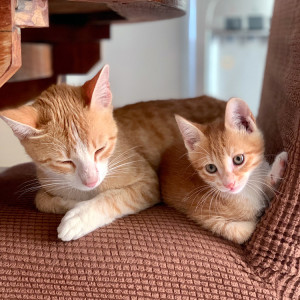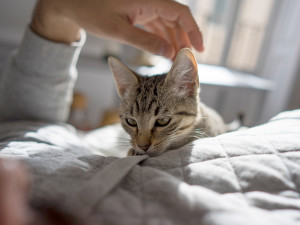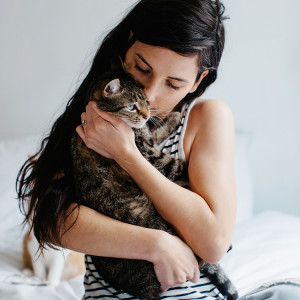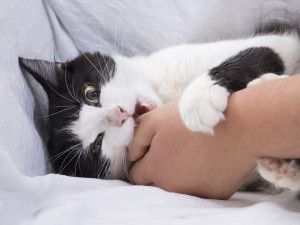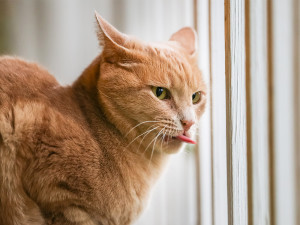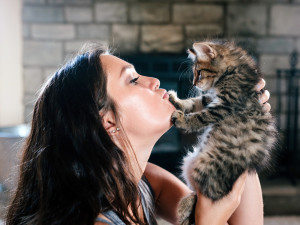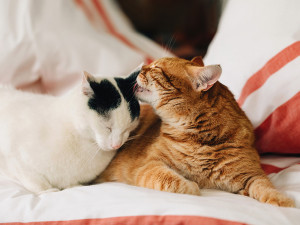
Share Article
In This Article:
Kitten Licking My Nose: Reasons and Interpretations Potential Health-Related Reasons for Excessive Licking How Do Kittens Show Affection? Frequently Asked Questions
You may think it’s the best thing ever. It may gross you out a little. It can even be uncomfortable with their rough little tongues. We’re talking about tiny kittens crawling up your chest, looking into your eyes, and lickin’ away… at your nose. What’s the deal?
Kitten licking my nose: reasons and interpretations
There could be many reasons your kitten licks your nose. They may even nibble on it a bit. We obviously can’t ask them why. But we can draw some conclusions based on what we know about cats.
Affection
It’s the warm fuzzies. Your kitten may be licking your nose as a way of showing their affection. Our faces are the source of all the sweet things we say to them. We nuzzle and smooch their little heads. It makes sense that they’d climb up to the place where all that action happens to show their love. Plus, our noses stick out, making them easy targets.
Grooming instincts
Cats are big groomers, both of themselves and other animals and people. It can be a cleanliness thing or an opportunity for bonding. Again, our noses are easy for them to access. We often have a natural salty taste to our skin and wear skincare products that could have a taste or scent that attracts our kittens.
Social bonding
Licking and grooming are important parts of cat relationships. Mothers groom kittens. Kittens groom their littermates. Adult cats go on to groom each other… and sometimes us. Yes, it can be an act of cleaning. There’s a closeness and connectivity to the act of grooming. Sometimes, it’s a cat’s way of saying, “Hey, you need to respect me,” as they pin another cat and lick their head.
For some kittens, especially those who may have been bottle-fed, their fixation with your nose could be similar to suckling the end of your pinky or shirt collar. They could be trying to replicate the sensation of nursing.
Scent marking
Scent marking with their tongues? Yep! When you’ve got multiple cats, you’ll often notice one grooming the others. That’s the allogroomer. They’re creating a group scent — a unique scent that every cat in that group shares. This is an important tool for the cats to recognize and feel safe with each other. It’s an instinctual behavior kittens are likely to engage in with other cats and their people.
Attention-seeking
Kittens learn quickly what works and what doesn’t when it comes to getting your attention. It’s pretty hard not to react when they’re licking your nose, whether you like it or not. They log that information away and may use it when other tactics aren’t working — like at 4 a.m. when you’re trying to sleep.
Potential health-related reasons for excessive licking
While being licked by a kitten is usually wonderful, it’s important to recognize that medical and behavioral triggers could be at play in some cases.
Stress-related licking
A kitten or cat may lick excessively if they feel anxious. It can be self-soothing behavior and even turn into a compulsive one. If your kitten is licking a lot, they’re hard to distract and redirect to other activities, or they’re showing other signs of stress, talk to your vet.
Signs of stress can include:
Nervousness
Hiding, cowering, or slinking
Not playing, eating, or drinking normally
Trying to look smaller
Sensitivity to petting or handling
General anxious body language
Medical conditions
Cats are very mysterious when it comes to alerting us to potential medical issues. Licking your nose (or other areas) could be one of those. If they’re feeling oral pain, have digestive issues like nausea, or feel physical discomfort anywhere, they could lick more than normal. There could be other causes as well.
When to consult a veterinarian about licking
Err on the side of caution, especially with a kitten. If you have any concerns or you notice an increase in your kitten licking your nose (or anything else, for that matter), contact your vet. Odds are it’s not a medical issue. But kittens can decline quickly if something is wrong. So, don’t wait. Give your vet a call.
How do kittens show affection?
Kittens show affection in many of the same ways older cats and other animals do. And every one of them is a wonderful experience.
Purring, kneading, and head-butting
Purring is a crowd favorite. While cats can purr to self-soothe in times of stress, it’s usually a sign of comfort and contentment. Kneading is similar. We call it making muffins, making biscuits, happy paws, or, in my case, squishy paws. Kittens knead instinctively during nursing to stimulate milk flow. This behavior sticks with them throughout their lives. It can be self-soothing or a display of happiness and security.
Head-butting is also referred to as head-bunting. This is when a kitten or cat essentially rams you with their head, usually followed by rubbing you with their head, shoulders, and flank. It’s a lovely gesture that can mean they want to mark you with their scent and encourage you to engage with them.
Following and seeking proximity
If your kitten follows you around, wants to be in your lap, on your shoulder, or generally all up in your business, that can be a sign they’re bonding with you and enjoying your attention.
Slow blinking
The slow blink is a universally recognized sign that a cat is giving you the good stuff. This behavior can start early. If your kitten slow blinks at you, return the gesture. Give them a slow blink back and then turn your gaze away (as opposed to staring at them, which can be stressful for cats because that’s what they do to potential prey).
FAQs (People also ask):
Is it safe to let my kitten lick my face?
As long as your kitten isn’t licking in an obsessive way (which can be a sign of stress), and you don’t have any lotions or products on your face that could make a kitty sick, it’s generally fine for your kitten to lick your face.
Can your cat imprint on you?
Your cat can imprint on you in the sense that they can form a strong bond or attachment with those who provide care and affection. They may even get a little anxious when separated from you for too long.
References:

LeeAnna Buis, CFTBS, FFCP
LeeAnna Buis has adored cats her entire life and thought she knew them inside out and sideways. But it wasn’t until she worked with a feline behavior consultant that she fully understood how incredible, complicated, and inspiring they really are. She made a career change, starting the certification process to become a behavior consultant right away. She discovered what unique, fascinating, complex creatures cats are and knew this was what she wanted to do with her life — help others on a similar journey to truly knowing, loving, and appreciating their cats.
LeeAnna earned her certification through Animal Behavior Institute, earning the certified feline training and behavior specialist (CFTBS) designation.
Related articles
![dark-haired woman hugging cat that has imprinted on her]()
10 Signs Your Cat Has Imprinted on You
Feeling like you have a little shadow these days? Here’s why that’s happening.
Why Does My Cat Rub His Face on My Face?
You’re gettin’ awfully close there, pal.
![cat biting person's hand]()
Why Does My Cat Bite Me?
Don’t live in fear of your feline overlord.
![Cat sticking its tongue out in motion]()
Why Does My Cat Drool?
Dogs rule, cats drool. Like, that’s normal, right?
![Woman holding brown kitten to her face.]()
8 Myths About Your Kitten—Busted By a Behaviorist
Forget everything you think you know about baby cats.
![Two tabby cats cuddling each other with their eyes closed]()
Cats Aren’t Loners, After All
Cat behaviorist Kristiina Wilson on the importance of socializing cats.

